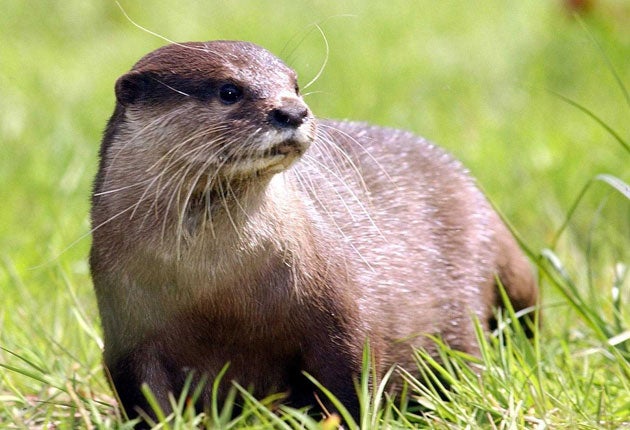The incredible journey of an intrepid otter
Discovery on Northumbrian island means animal swam three miles in North Sea, to amazement of naturalists

It's not quite swimming the Channel. But it's still quite a feat. An otter has risked facing storm-force gales and the strong currents of the North Sea to make the three-mile journey to reach Brownsman, one of the Farne Islands, off Northumberland.
It is the first record of an otter on the Farnes, well known as a home to more than 80,000 seabirds, including a famous colony of puffins, and a healthy population of grey seals, and its presence – revealed by unmistakable tracks along a muddy path – has astonished naturalists.
"It is staggering that an otter could survive the perilous journey out, especially to Brownsman, which is a long way from the mainland," said David Steel, head warden of the islands, which are owned and run by the National Trust.
"We almost had to rub our eyes with disbelief when we discovered the tracks; we've recently had force nine gales, and it can be tricky to reach the islands even on a relatively calm day, which makes this otter's journey a little bit special."
The tracks, which stretch for 60 metres, were discovered on a muddy path which had until recently been a boardwalk for visitors to Brownsman. Wardens are yet to catch sight of the animal but the agitated behaviour of the gulls suggests that it is still living on Brownsman and the outer group of islands.
Divided into two island groups, inner and outer, the most distant island being nearly five miles from the coast, the Farnes have no permanent population, the only residents being National Trust wardens during part of the year. But they were the site of various hermitages for saints and monks of early Celtic Christianity, such as St Aidan and St Cuthbert. Today they are an attraction for tourists rather than hermits, and more than 43,000 people visit them every year between April and the end of September, in regular boat trips from Seahouses on the Northumberland coast. (The islands are now closed until 1 April 2009).
Although otters are frequently found on coastal sites in Scotland, in England and Wales they are normally found living on rivers, having recovered strongly from the dramatic population crash of the 1950s and 1960s which was probably caused by pesticides and other pollution affecting rivers.
Northumberland has a healthy population of otters living on the major rivers of the county and their tributaries, and this new addition to the Farne Islands will have made its way from one of these. "We have no idea how long it might stay, but the rocky islands offer it a safe place to live, and it should be able to find an abundance of food," said Mr Steel.
Paul Chanin of the Mammal Society, who has written two books on otters and studied their recovery in England, said: "We know that otters like living on the coasts and will sometimes travel to islands where there is food available, but to find them so far offshore shows that they have a remarkable ability as navigators."
The otter: A mammal on the march
* Otters are mustelids and belong to the group of carnivorous mammals which includes stoats, weasels, mink and badgers.
* They can live up to 10 years.
* They feed on fish, crustaceans, waterbirds, frogs and voles.
* Usually active at dusk and during the night, they can sometimes be seen in daylight, but they are usually resting in a holt, which is a burrow found in the river bank, or rocky shores.
* The number of otters found on rivers in southern and central England declined dramatically in the 1950s and 1960s but has been steadily recovering since the 1970s.
* Otters are mainly detected by their characteristic spraints, which have a tarry smell. Sprainting sites are often under bridges or tree roots.
Join our commenting forum
Join thought-provoking conversations, follow other Independent readers and see their replies
Comments
Bookmark popover
Removed from bookmarks